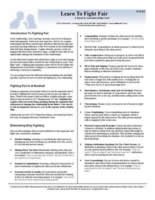All Couples Should Learn To FIght Fair. Here's How
Check out our mini-guide on how to fight fair, and stop letting badly handled conflict cause pain in your relationships. Download it NOW!
What You Need To Know About Conversational "Cons"
Can You Tell When People Are Lying?
"A fascinating quick introduction to help you identify 'hidden agendas", and even subtle deceit by using basic psycholinguistic techniques"
Most of us aren't really able to determine if someone is lying to us, unless we know the person quite well. There really aren't "universal signs" of deceit.
However, there are "signals" or "markers" commonly used by people who are operating on the basis of an agenda they are not disclosing to the other person. These markers aren't fool-proof but they do tell you that "something" might be going on that you need to attend to in your interactions with a person. Consider them warning signals.
Interestingly enough, we all use some of these signals quite often, even if we are not aware that we have another "agenda" beyond the one we are aware of. So, not only can looking at how we interact tell us something about the other person, but looking at our OWN signals can tell us that we might be missing something going on within.
Which brings us to "conversational cons", our term for the family of signals or markers to look for.
This LearnBytes Helpcard, one of our more unusual offerings, is based on our work with language and how it affects credibility, and how it is used and misused in human interactions. It's based on the idea that certain kinds of language suggest that a person has a "hidden agenda" that is affecting what they say. It's possible observe a person's language and words and get a sense as to whether they are trying to manipulate or influence in indirect ways.
What's as important is that we all get out of touch with our motivations, and unconcously try to influence others without being upfront with ourselves or the other person. It's not that users fo conversational cons are bad people. It's just that we are human and sometimes don't realize what underlies our actions. By understanding how language is used to affect people, we can observe ourselves in conversation. If you understand the principles of conversational cons you can monitor, and re-evaluate yourself -- a means of extending self-knowledge and self understanding, and stay out of situations where you might start accidentally manipulating some other person as a result of an agenda you, yourself are not yet aware of.
The results, whether it's you or another person using conversational cons, is more awareness and better relationships!
The Point: Language is a funny thing. We all learn early on in life how to use verbal techniques to get our own ways, even when those tactics don't really work very well with adults. In fact, often, they create arguments and bad feelings. We call those verbal techniques "conversational cons".
The purpose of this helpcard is to a) help you become more aware of when you use conversational cons, so you can improve your relationships, and b) become less likely to be the victim of conversational cons when they are used by others.
What's Included:
What You Need To Know About Conversational Cons Helpcard contains the following:
- What is a "good faith conversation"?
- What's a "bad faith conversation"?
- How to recognize 18 conversational cons
- Tips on how to deal with conversationsl cons when they are aimed at you.
 Manage Conflict - Resolve Conflict - Prevent Conflict
Manage Conflict - Resolve Conflict - Prevent Conflict 


